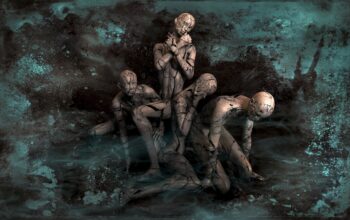Until society represents everyone, the question will always be “Where do I belong? Do I belong?” Aisha Thomas, Why Representation Really Matters, TEDxBristol, 2019.
The world of arts, including literature, films, and television, is not only made to entertain us. It is often seen as a mirror of reality, but this mirror is not always been truthful about the real world. The reality that we sometimes read about or see in TV and films is not like the one that we live in every day, but it is made up predominantly of privileged people according to their class, origins, gender, sexual orientation, and ethnicity. This representation that we are used to is far from the real shape of our world as it fails to include all the people that are part of it, and this is when an intersectional approach comes into play. But why does entertainment need an intersectional approach and why is the representation of all the people that make up society important?

“There are two primary reasons why representation is important: inclusivity and perception. Seeing people who look, act, and experience life like them in media makes a person feel included in a society, and it reinforces positive views of themselves and what they can achieve in society”.
Representation matters. Especially for young people. When young people belonging to a marginalised category see themselves on screen or in a book, they will feel empowered, they will think that if the person on screen is the hero they can be too, they will think that if the actor on screen has managed to land that role, they can too. A few months ago, the picture (right) of 2-year-old Kenzo Brooks went viral. He was watching Disney’s Encanto and started smiling and clapping as soon as he noticed his resemblance with one of the characters. Kenzo’s mother stated that it was a powerful and emotional moment for her, since she couldn’t have the same experience growing up. Kenzo’s story is only a small proof of what representation can do. It allows people in marginalised position to dream bigger, to aim at greater roles, and not the ones that society has decided for them.
Having one type of person dominate all the narratives may be dangerous as it might make us feel unimportant, left out, like our stories are not worth being told. This is how Nigerian writer Chimamanda Adichie felt growing up. In her Ted Talk The Danger of a Single Story in 2009, she explained that growing up she used to read mainly British children books and, as a result, she wrote similar stories, even though they had nothing to do with her life or identity. “Because all I had read were books in which characters were foreign, I had become convinced that books by their very nature had to have foreigners in them and had to be about things with which I could not personally identify (The Danger of a Single Story, 02:24)”, and if Adichie felt like she did not exist in literature, it means that for many of those people who were represented in those books, she did not exist at all. Minorities are not the only ones that can benefit from a better and more truthful representation in arts. Representation can be used as a powerful instrument against ignorance. “Accurate, authentic representation can break down barriers, open us to new ideas, create powerful role models, and even be a source of inspiration”, it can show us what reality is like for people with different identities, so we can be understanding instead of being afraid. Representation in arts, especially in films and TV shows, can have a normalising function. Seeing minorities included in contexts that simulate reality will let any viewer know that those minorities can be perfectly integrated and must be considered as part of our reality rather than seen as “other”.
However, representation, as stated above, must be accurate. It must tell the exact stories and the exact ways people live, otherwise we might fall in the stereotype trap. For years minorities have been represented in stereotypical ways, reinforcing the discrimination that they have to endure. In The Danger of a Single Story, Adichie talks about how the narrative about African countries always told the same story, making people believe that each person had a story of poverty, grief, and war, instead of conveying the truth about many different countries, with different cultures and different histories. Real and accurate representation means overturning the stereotypes. It means that people that play the marginalised role finally get the lead. It means showing that belonging to a certain group does not mean behaving in a certain way. It means showing that the Latin woman is not always a maid, that the black teenager is not always a drug dealer, that the woman in career is not heartless. It means showing that there is a whole spectrum of gender and sexual orientation that can’t be defined by stereotypes.
However, in today’s narratives, things are changing. The world of arts is becoming more diverse and inclusive and there are plenty of examples to prove that. Literature is giving more space to emerging writers, making sure that the stories of minorities are told by minorities themselves. Films and television are changing too, with actors, directors and writers pushing for Inclusion Riders. At the 2018 Academy Awards ceremony, the American actress Frances McDormand ended her speech saying, “I have two words to leave with you tonight, ladies and gentlemen: inclusion rider”. The idea behind the expression was developed by American professor Stacy L. Smith; it indicates a provision in an actor’s or filmmaker’s contract that provides for a certain level of diversity in casting and production staff. For example, the rider might require a certain proportion of actors or staff to be women, people of color, LGBT people or people with disabilities.
In conclusion, representation is not a superficial concept as many people would believe. Accurate representation can actually change our perception of the world for the better, shaping our minds for inclusion and diversity.
Francesca Cumo
References:
https://lisbdnet.com/why-does-representation-matter/#:~:text=There%20are%20two%20primary%20reasons,they%20can%20achieve%20in%20society (last access 30/03/2022).
https://people.com/human-interest/2-year-old-boy-lights-up-over-encanto-character-resemblance/ (last access 31/03/2022).
https://www.ted.com/talks/chimamanda_ngozi_adichie_the_danger_of_a_single_story/transcript (last access 31/03/2022).
https://en.wikipedia.org/wiki/Inclusion_rider#:~:text=An%20inclusion%20rider%20or%20equity,people%20or%20people%20with%20disabilities. (last access 03/04/2022).
https://www.npr.org/sections/thetwo-way/2018/03/05/590867132/whats-an-inclusion-rider-here-s-the-story-behind-frances-mcdormand-s-closing-wor (last access 03/04/2022).



